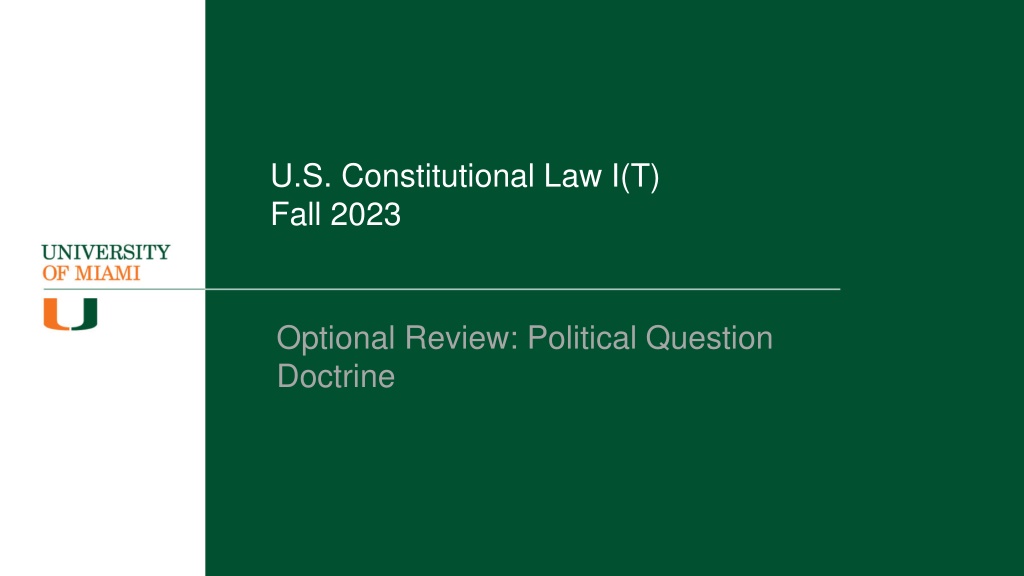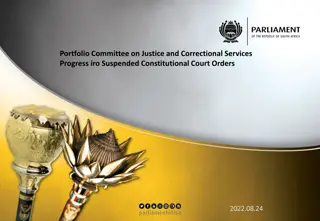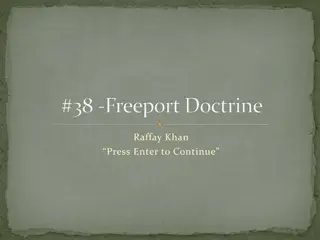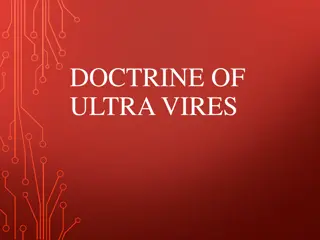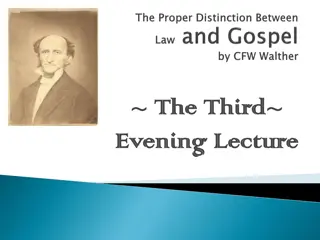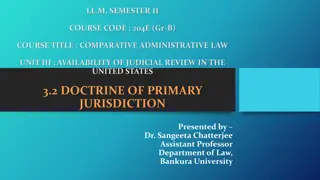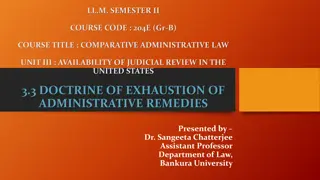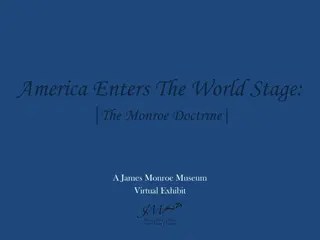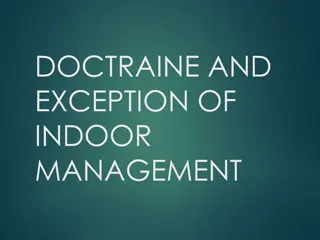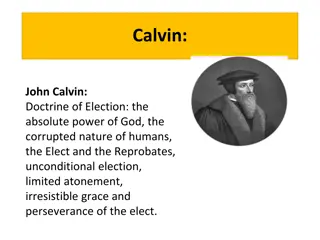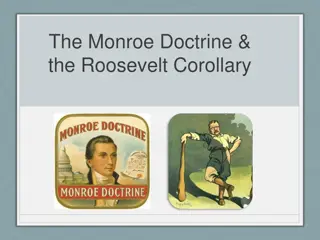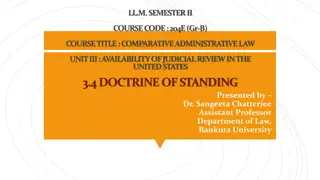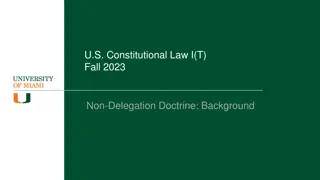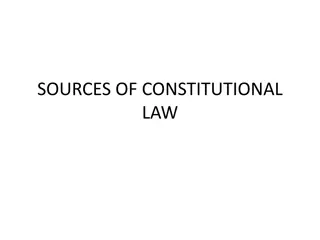Understanding Political Question Doctrine in U.S. Constitutional Law
Explore the intricacies of the Political Question Doctrine in U.S. Constitutional Law, focusing on key aspects such as textually demonstrable commitment, lack of judicially manageable standards, and the impact of standing on legal cases. Scholars debate whether the doctrine is jurisdictional and its implications on legal proceedings involving political questions.
Download Presentation

Please find below an Image/Link to download the presentation.
The content on the website is provided AS IS for your information and personal use only. It may not be sold, licensed, or shared on other websites without obtaining consent from the author. Download presentation by click this link. If you encounter any issues during the download, it is possible that the publisher has removed the file from their server.
E N D
Presentation Transcript
U.S. Constitutional Law I(T) Fall 2023 Optional Review: Political Question Doctrine
Political Question Doctrine Checklist from Baker v. Carr (CB 120) 1. Textually demonstrable commitment in constitution of issue to political department 2. Lack of judicially manageable standards; impossibility of deciding without initial policy determination 3. Unusual need for unquestioning adherence to political decision already made; embarrassment from multitude of pronouncements by various departments
Political Question Doctrine: status First, comparestanding: Standing is jurisdictional. If the plaintiff does not have standing, then the case must be dismissed. Standing applies at all levels of the federal judiciary. Standing cannot be waived. This approach to standing isn t logically compelled. In some states, which have their own standing requirements based on their state constitutions, standing is required but not considered jurisdictional, and so can be waived.* * F. Andrew Hessick, Cases, Controversies, and Diversity, 109 NW U.L. Rev. 57, 67 (2015)
Political Question Doctrine: status Comparestanding (cont.) Effect of lack of standing on a case: One plaintiff, one claim, no standing: Action: dismiss the whole complaint; end of case. One plaintiff, three claims: Standing as to two of the claims, not as to the other one: Action: dismiss one claim, but not the whole case. Let the suit proceed on the claims as to which the plaintiff has standing.
Political Question Doctrine: status Is Political Question Doctrine Jurisdictional? Scholars disagree. Effect on a case: Waivable? Clearly not, if jurisdictional But perhaps not waivable even if not jurisdictional. Especially as to Factor One: Textually demonstrable commitment in constitution of issue to political department. Sounds like a constitutional command to courts not to get involved
Political Question Doctrine status Effect on a case: One plaintiff, one claim; the claim presents a political question. Action: dismiss the case. One plaintiff, three claims: One claim presents a political question; two others do not. Action: dismiss one claim, but not the whole case. Let the suit proceed on the claims as to which the plaintiff has standing.
Political Question Doctrine: status Effect of political question doctrine on a case: Sounds very similar to standing, but one twist in Baker v. Carr
Baker v. Carr: Facts Voting districts in TN for state legislature wildly different in size. Even as of 1962, TN was using the apportionment it had made in 1901 after the 1900 census. Effect: 37% of the voters represented by 20 of the 33 state senators; the other 63% represented by 13 40% of the voters represented by 63 of the 99 members of the House; the other 60% represented by 36 members Largely urban/rural divide, favoring rural voters
Baker v. Carr: Facts Plaintiffs (voters in underrepresented districts): The legal basis for their challenge to this malapportionment is that it violates the Fourteenth Amendment equal protection clause. State can t treat voters so differently on something so fundamental (the right to vote). District court dismissed on general grounds of non- justiciability, concerned about whether it had the power to grant any relief
Baker v. Carr: Facts/Background An anti-discrimination case in effect, as well as a voting rights case: 1910: 89% of all Black people live in South, and 80% of them live in rural areas. 1960: 60% of all Black people live in South; 75% of Blacks nationwide live in cities.* Significance: in 50-year period, the Black population nationwide went from largely rural to largely urban. Rural versus urban distinction not entirely reducible to race, but race played some role. * Quotes and figures from Robert M. Crea, Racial Discrimination and Baker v. Carr, 30 J. Legis. 289 (2004)
Baker v. Carr: Facts/Background The general misrepresentation of urban voters relative to rural voters in many states translated to proportionately greater misrepresentation of blacks. Malapportionment in the South was used sometimes as a weapon to minimize the African American vote. Its potency was enhanced by the fact that it was the intangible product of omission rather than overt discrimination, effectively shielding it from Fifteenth Amendment based claims. The most seriously underrepresented central city counties were all in the South-the counties incorporating Atlanta, Miami, Houston, and Dallas. * * Quotes and figures from Robert M. Crea, Racial Discrimination and Baker v. Carr, 30 J. Legis. 289 (2004)
Baker v. Carr: Facts Tennessee 1950: Memphis: 7 representatives in the state legislature Twenty-four surrounding counties: Same population in total as Memphis 26 representatives in the state legislature Blacks in Memphis represented 36% of the population in the 1950s. * * Quotes and figures from Robert M. Crea, Racial Discrimination and Baker v. Carr, 30 J. Legis. 289 (2004)
Baker v. Carr: Facts/Background Gomillion v. Lightfoot (1960): Intentionally redrawing city boundaries to exclude Black people from voting in city elections violates the 15th Amendment Alabama redrew boundaries of Tuskegee from a square shape to a 28-sided shape, excluding almost all Black people. Why not challenge malapportionment on the basis of the 15th amendment as well as the 14th? Its potency was enhanced by the fact that it was the intangible product of omission rather than overt discrimination, effectively shielding it from Fifteenth Amendment based claims. * * Quotes and figures from Robert M. Crea, Racial Discrimination and Baker v. Carr, 30 J. Legis. 289 (2004)
Political Question Doctrine Baker v. Carr (CB 120): Issues The legal basis for their challenge to this malapportionment is that it violates the Fourteenth Amendment equal protection clause. State can t treat voters so differently on something so fundamental (the right to vote). Supreme Court later agreed (Reynolds v. Simms): one person one vote Districts must be equal in population size
Political Question Doctrine Baker v. Carr Structural role of court intervene to protect democracy and individual rights (voting rights) where political process is unlikely to, because of a structural defect Compare to Marshall s argument in McCulloch v. Maryland: Non-Marylanders have no political power to pressure MD to change the tax on the national bank; Court strikes it down. What is the defect? those benefitting from malapportionment, if they have a majority, will resist changing it
Political Question Doctrine Baker v. Carr Counter-argument: Frankfurter (dissenting): Appeal must be to an informed, civically militant electorate ; relief must come through an aroused popular conscience that sears the conscience of the people s representatives (CB 122)
Political Question Doctrine Baker v. Carr What makes this a political question doctrine case? The state argued that there was no way to decide the plaintiffs Equal Protection Claim without also ruling on the meaning of the Guarantee Clause.
Political Question Doctrine Baker v. Carr Art. IV 4 (The Guarantee Clause): The United States shall guarantee to every State in this Union a Republican Form of Government, and shall protect each of them against Invasion; and on Application of the Legislature, or of the Executive (when the Legislature cannot be convened) against domestic Violence. Is malapportionment in state legislature mean that the TN does not have a Republican Form of Government ?
Political Question Doctrine Baker v. Carr Why not raise Art. IV 4, too? Luther v. Borden (1849) (CB 139-140): The Court pronounced all Guarantee Clause issues to be political questions As a practical matter: The meaning of Art. IV 4 Guarantee clause will never be judicially determined, so long as the issue Consistent with Marbury v Madison?
Political Question Doctrine Baker v. Carr The Court in Baker v. Carr: We can decide this case solely on the basis of Equal Protection No need to rest any decision on the Guarantee Clause Remanded to consider whether there is an Equal Protection violation. In fact, the Supreme Court later held, in Reynolds v. Sims (1964): one person one vote Districts must be equal in population size
